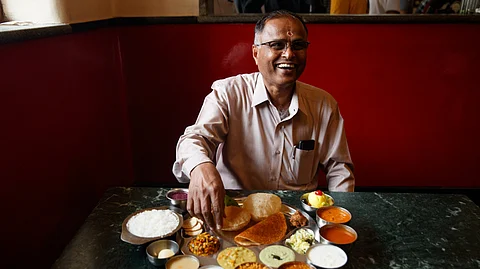

Driving past Lal Bagh Main Road in Bengaluru, one cannot miss the serpentine queue outside Mavalli Tiffin Rooms – more popularly known as MTR – a heritage south Indian eatery housed in a two-storied building with an unobtrusive art deco façade. Customers trudge from far and near to savour classic tiffin dishes such as uddina vade and bisibele bath and sweetmeats such as the chandrahara, a crowd favourite, in the spartan interiors.
The aroma of authentic filter coffee, freshly steamed rava idlis, and the iconic masala dosa wafting from the kitchen will lure any passerby to stop and step inside for a meal. It is no wonder that the renowned restaurant chain has completed a 100-year run.
To mark the 100th anniversary, siblings Hemamalini, Vikram, Arvind, and Priyadarshini Maiya, the current custodians of MTR, released the coffee table book, The MTR Story: A Labour of Love. Authored by Pratima Chabbi, the book chronicles the legacy of the chain from its humble beginnings in 1924, its history, the people behind it, its consistent growth and metamorphosis as a gastronomical landmark representing authentic vegetarian south Indian cuisine.
MTR was founded by three brothers who arrived in Bangalore from Parampalli, a nondescript coastal hamlet in Udupi, seeking greener pastures. After initially working as household cooks, the Maiya brothers donned the entrepreneurial hat back in 1924 and opened the Brahmins Coffee Club. This restaurant grew to become MTR, with Yagnanarayana, the youngest brother – fondly called Yagnappa – taking the lead and propelling MTR to great heights.
Post a European sojourn, Yagnappa introduced incredible innovations, stringent protocols of sanitation and hygiene, quality service and presentation, and so on – all of which he incorporated into the new restaurant at the current location on Lal Bagh Road, which came into existence in 1960.
Hemamalini’s father Harishchandra, who was Yagnappa’s nephew, had been handling the chain since 1968. She took over the reins soon after her father’s death in 1999.
The book also delves into how the restaurant weathered the storms of the freedom struggle, WWII, the turbulent Emergency, and the recent Covid pandemic, innovating and reinventing itself each time.
Realising that the stories of customers and family members were never recorded for posterity, Hemamalini felt the need to document the eatery’s journey. The idea took off seriously only when she met Pratima and tracked the genesis of the restaurant and its lesser-known aspects, bringing its history to life with her experience in the food industry.
“The book charts the legacy of the chain from its humble beginnings to its continued growth. It’s the saga of the men and women who built MTR, its unseen workers, the founders, the generations who made MTR what it is today and the loyal patrons who have kept the legacy alive. The book will take you on a journey beyond the plate to meet the hands and hearts that have made MTR the beloved institution it is today and what kept it going all these years. It is a chronicle of our century,” says Hemamalini.
Other innovative ventures include the ‘MTR in Your Car’, which enabled customers to enjoy its delicacies from the comfort of their cars. MTR is also credited with the creation of the now legendary rava (semolina) idli and the Sunday special sweet chandrahara, named after a blockbuster movie.
Another characteristic element of the chain is the open walk-through kitchen. “Long before open kitchens were fashionable, customers were given direct access to watch their food being prepared. It was a bold move back then, we still follow it to this day,” says Hemamalini, recollecting countless small traditions that have shaped MTR.
The contents of the book were a revelation for Hemamalini as well. “I had never heard some of these stories. As we worked on the book, I felt like I was travelling back in time, discovering things: the significance of the silver kettles, the mugs, and the incredible journeys my uncles took. One of the most interesting things was how the thaali was introduced in 1998,” she explains.
When Hemamalini took over MTR, she was the first woman from her family to step in. She had to face many challenges, making it a day-to-day survival game for her.
“I had to face initial hiccups and resistance from old-time employees. It was an unnerving task as they had seen me as a kid and were now seeing me in an entirely different role. And it was difficult for them to accept a woman boss. Similarly, there was resistance from suppliers initially when I tried to rectify the decline in the quality of ingredients. I had to fix everything, right from quality check, finance, human resources and the kitchen as well as deal with bloated egos, union issues, and restaurant politics,” she recalls.
Realising that in order to sustain and thrive they had to change with the changing times and keep pace with the growing city, they opened outlets in Singapore and Dubai where the Indian community had a significant presence. Unlike the outlets in Bengaluru and Udupi that are wholly owned and operated by Hemamalini and her brothers Vikram and Arvind, the ones abroad are run via franchisees. Today, Arvind handles labour issues while Vikram handles operations. Apart from steering the venture, Hemamalini is closely involved with finance and accounts at MTR.
What makes the restaurant unique is its focus on integrity, quality food, high standard of hygiene, and value for money. This simple philosophy has been the pillar of growth for brand MTR, Hemamalini says.
Susheela Nair is an independent food, travel and lifestyle writer and photographer contributing articles, content and images to several national publications besides organising seminars and photo exhibitions. Her writings span a wide spectrum which also includes travel portals and guide books, brochures and coffee table books.